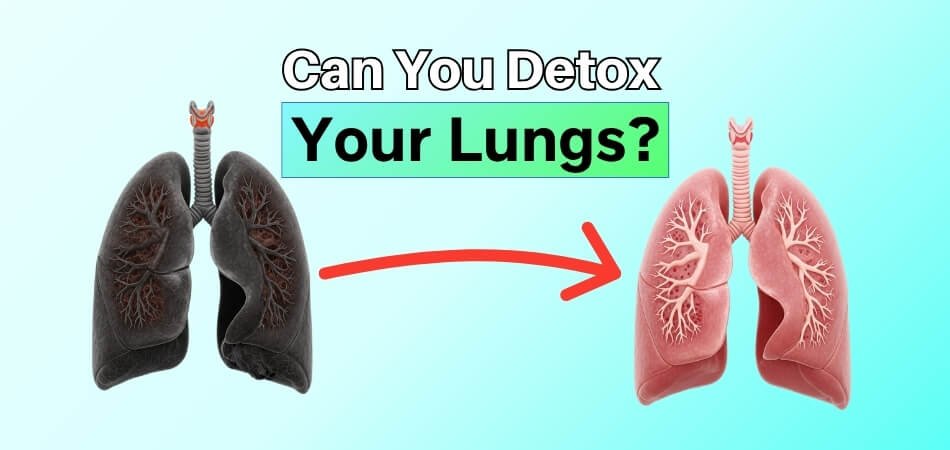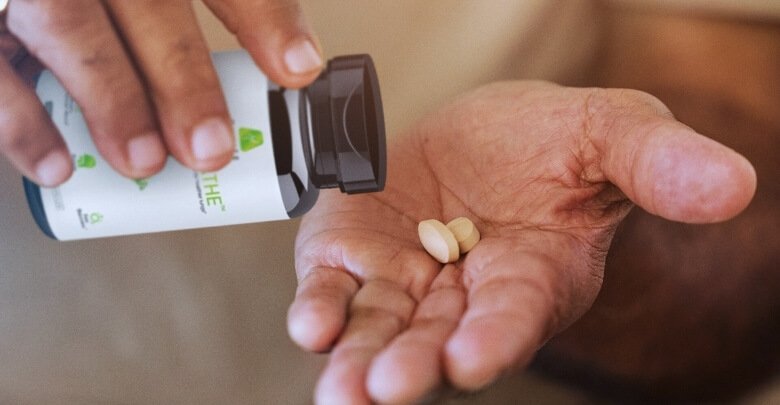Your lungs work hard every day. They help you breathe and give your body the oxygen it needs. But things like smoking and air pollution can harm them. Some people say you can “detox” your lungs with special products—but is that true? Can you detox your lungs?
You cannot detox your lungs with quick fixes or special products. But your lungs clean themselves if you stop smoking and avoid air pollution. Drinking water, eating healthy foods, and exercising help your lungs heal. Over time, your lungs can get better on their own with good habits.
Want to learn more about what really helps your lungs? Keep reading to find out what works—and what doesn’t.
Can You Detox Your Lungs?
Yes, it is possible to detoxify your lungs, but no, you can’t “detox” your lungs with special drinks or pills that promise fast results. But your lungs do clean themselves when you stop harmful habits like smoking and stay away from pollution. With time and healthy choices, your lungs begin to heal and work better. So, it’s not a magic solution-it’s a natural process that truly works.

Quitting Smoking Helps Your Lungs Heal
Smoking hurts your lungs by damaging the tiny air sacs and making mucus build up. When you stop smoking, your lungs slowly remove mucus and harmful particles on their own. After quitting, your breathing may feel easier, and coughing may happen as your lungs begin to clear out.
Avoiding secondhand smoke and vaping is just as important for lung repair. Breathing in others’ smoke harms your lungs even if you don’t smoke yourself. Over time, lungs that are no longer exposed to these irritants start working more efficiently again.
Avoiding Air Pollution Is Key
Air pollution, both inside and outside, fills your lungs with harmful particles and chemicals. These irritants make it harder for your lungs to clear mucus and breathe freely. Over time, this can lead to breathing problems and even long-term disease.
You can protect your lungs by checking air quality before going out and avoiding areas with heavy traffic or smoke. At home, air purifiers and houseplants can help remove dust and chemicals from the air. If you reduce pollution exposure, your lungs can slowly repair and get stronger.
Water Helps Clear Mucus
Drinking water helps keep your lungs moist and makes mucus thin and easier to clear. When mucus is thick, it builds up and traps unwanted substances inside your lungs. Staying hydrated helps your lungs flush out what they don’t need.
Try to drink enough water every day to support this natural process. Herbal teas and warm drinks can also soothe your throat and help break down mucus. Though it may seem simple, hydration plays a powerful role in lung recovery.
Exercise Supports Lung Function
Moving your body helps your lungs work better and improves how oxygen moves through your blood. Aerobic exercises like walking, swimming, and cycling train your lungs to use air more efficiently. Exercise also makes your chest muscles stronger, helping you breathe deeper.
When you work out regularly, your lung capacity improves over time. This means your lungs can hold and use more air with each breath. Fitness tools like OmniBreathe may also offer guided breathing techniques that support healthy lung habits.
Healthy Foods Can Reduce Lung Inflammation
What you eat affects your lungs more than you may think. Some foods can lower swelling in the lungs and make them stronger. Antioxidants found in vegetables, garlic, and berries help protect lung cells from damage.
A healthy diet helps your body fight off toxins and improves healing. Try adding foods like turmeric, ginger, and leafy greens to your meals. These support your immune system and make breathing feel easier over time.
Steam Therapy Loosens Mucus
Inhaling warm steam may help break up mucus that clogs your lungs, especially during a cold or allergy. Though it doesn’t fix lung damage, it can offer relief by opening airways and making it easier to cough.
Use steam safely with warm showers or bowls of hot water to breathe in the mist. Adding herbs like eucalyptus can make the steam feel more soothing. Just remember, it helps symptoms, not the root cause of lung problems.
Lung healing isn’t quick, but small efforts every day make a big difference. You don’t need fancy products—just healthy habits. When you stay consistent, your lungs thank you with every breath.
Which Actions Cause Your Lungs to Go Bad?
Your lungs are strong, but certain habits and exposures can slowly wear them down. Breathing becomes harder when lung tissues get hurt. Damage often starts small but grows over time with repeated harm. Knowing what causes it can help you protect your lungs every day.
- Smoking and Vaping: Cigarettes and e-cigarettes weaken your lungs by burning tissue and blocking airways with tar and toxins over time. Even secondhand smoke hurts.
- Toxic Chemical Exposure: Breathing in dust, asbestos, or gas fumes at work or home builds up over time and scars lung tissue. Chronic issues may follow.
- Indoor Air Irritants: Heaters, stoves, and burning wood release gases like nitrous oxide that inflame your lungs and worsen breathing problems quickly. Keep the air clean.
- Lung Infections: Infections like pneumonia can cause swelling, destroy lung cells, and leave lasting damage after repeated flare-ups. Strong immunity lowers your risk.
- Allergens and Dust: Mold, pet dander, and carpet dust can trigger allergic reactions that lead to inflammation, tightness, and reduced lung function. Clean regularly.
- Radiation and Drugs: Certain cancer treatments or heart medicines may scar your lungs with prolonged use, especially if not carefully monitored. Talk to your doctor.
- Genetic Conditions: Rare genetic issues like alpha-1 deficiency can make your lungs break down faster, even without smoking or visible triggers. Early testing helps.
- Chronic Irritation: Conditions like asthma and bronchitis can inflame the lungs over time, making breathing harder and shrinking healthy airways. Avoid long-term triggers.
How Long Does It Take for Lungs to Heal After Quitting Smoking?
When you stop smoking, your lungs start to heal right away. After one day, your blood carries more oxygen. A few days later, your airways begin to relax, and you can breathe better. Tiny hairs in your lungs also start working again to clear out dirt and mucus.
In a few weeks, coughing and wheezing may slow down as your lungs begin to feel stronger. After nine months, those small hairs (cilia) work well again and help stop infections. In one year, your risk of heart problems drops by half. Healing depends on how much you smoked, but stopping always helps your lungs improve.
How OmniBreath Helps Detoxify Your Lungs?
Your lungs can clean themselves, but some products may help support that process. OmniBreathe is made to help you breathe better. It may clear mucus, calm swelling, and make lungs feel lighter.

Helps Remove Mucus
Mucus can block your airways and make breathing harder every day. OmniBreathe has herbs that thin mucus and help move it out. This can clear your lungs and ease coughing over time. Some users feel better after just a few days.
Ease Lung Swelling
Swelling in your lungs can make it hard to breathe, especially during walks or when climbing stairs. OmniBreathe may lower this swelling and help air move better. When the airways are clear, breathing feels easier and smoother. It can also reduce wheezing.
Soothes Allergy Signs
Dust, pollen, or pet hair can make your lungs feel tight or cause sneezing. OmniBreathe may calm these signs and make airways feel better. Some people also feel more energetic once they breathe more easily. You can read reviews or find a trusted place to buy Omnibreathe on health store sites.
Supports Lung Cleansing
OmniBreathe cannot undo lung damage, but it may help your lungs clean faster after quitting smoking. It works better when you also avoid smoking and stay active. Clean air, water, and rest help the lungs heal faster with support. Use it with good habits for the best results.
What Foods or Supplements Can Support Lung Healing and Detoxification
Foods and supplements that can support lung healing and aid in natural detoxification by reducing inflammation, improving lung function, and helping clear mucus include:
Foods:
- Green tea: Contains antioxidants that reduce lung inflammation and support lung health.
- Fatty fish: Rich in omega-3 fatty acids with anti-inflammatory and antioxidant properties that protect lungs from damage.
- Olive oil: High in anti-inflammatory antioxidants like polyphenols and vitamin E, linked to reduced asthma risk and improved lung function.
- Oysters: Provide zinc, selenium, B vitamins, and copper, nutrients associated with better lung function and protection against COPD.
- Yogurt: It contains calcium, potassium, phosphorus, and selenium, which may boost lung function and reduce COPD risk.
- Apples and citrus fruits: Rich in vitamins C, E, and beta-carotene, antioxidants that support lung health.
- Beetroot: High in nitrates, magnesium, vitamin C, potassium, and carotenoid antioxidants; nitrates help relax blood vessels and improve oxygen uptake.
- Garlic: Contains allicin with anti-inflammatory effects that reduce lung damage and lower infection risk.
- Chili peppers: Contain capsaicin that helps clear mucus from the respiratory tract and beta-carotene for immune support.
- Pumpkin: Rich in carotenoids with antioxidant and anti-inflammatory effects, beneficial for the lungs.
- Tomatoes: Loaded with vitamin C and lycopene, which support lung function and may counteract smoking damage.
- Broccoli: Contains sulforaphane, which helps eliminate nicotine toxins and repair lung damage from smoking.
Supplements and Nutrients:
- Antioxidant-rich vitamins and minerals: Vitamins C, E, selenium, zinc, and B vitamins support lung repair and reduce oxidative stress.
- Herbal supplements like mullein: Have expectorant, antibacterial, and antiviral properties that help remove mucus and support lung detox.
Which Exercises Can Help Keep Your Lungs Clear and Healthy?
Breathing might feel like something you don’t need to think about, but your lungs need care to stay strong and clear. When your lungs are healthy, you feel more active, focused, and full of energy every day. Simple exercises can really help your lungs work better without needing any special equipment. Let’s look at some easy and helpful ways to keep your lungs in good shape.

Aerobic Activity
Moving your body with activities like walking, dancing, or swimming helps your lungs breathe in more air with every breath. These exercises also make your heart beat faster, which trains your lungs to send more oxygen to your body. Over time, your breathing gets easier, even when you’re playing or running. Many people try running for better lung health because it really pushes the lungs to stay strong. The more you do it, the more air your lungs can hold and use.
Breathing Practice
Some breathing exercises help your lungs fill up with more air and also empty out fully. Diaphragmatic breathing means using your belly, not just your chest, to pull in air deeply. Pursed lip breathing is another method where you breathe out slowly through tight lips to keep airways open longer. There’s also rib stretch and numbered breathing to help your chest take in more oxygen. These are simple to try at home and need no tools at all.
Strength Training
Lifting light weights or doing bodyweight moves like planks or push-ups can help your lungs as well. These moves make your chest, back, and core stronger, which helps you breathe better. When your muscles are strong, they use oxygen more easily and waste less air. Good posture also matters because it gives your lungs space to expand fully. Doing these exercises just a few times a week can really help your lungs.
Yoga and Stretching
Yoga mixes breathing and movement, which is great for calm, deep breaths. The stretching and slow poses make your body more flexible, helping your chest open up more. Breathing slowly during yoga helps your lungs get more air and release stress as well. Pilates works in a similar way by focusing on your belly and back muscles. Together, they help you control your breath and feel more relaxed.
Tips to Help Your Bad Habits and Have Healthier Lungs
Bad habits can hurt your lungs. But small steps can help you feel better every day. You don’t need anything fancy to start. Just make simple changes that are easy to follow.
- Stop Smoking Slowly: Try smoking less each day. Keep your hands busy when you feel like smoking to break the habit.
- Drink Enough Water: Water helps clean your lungs. It makes thick mucus thin so your lungs can push it out better.
- Stay Active Daily: Walking or dancing helps your lungs work better. Moving your body helps you breathe deeper and feel fresh.
- Breathe Cleaner Air: Close windows on dusty days. Use a fan or air filter to keep the air clean inside your home.
- Laugh Every Day: Laughing pushes old air out of your lungs. It brings in fresh air and makes you feel good.
- Eat Healthy Foods: Fruits and vegetables help your lungs heal. Try to eat them often with your meals or snacks.
Frequently Asked Questions About Lungs Detoxification
Taking care of your lungs matters, especially if you’ve had unhealthy habits like smoking or breathing dirty air. While your lungs clean themselves, people often wonder what really helps and what doesn’t. Here are 10 simple and helpful FAQs.
Does Sleeping Well Help Lung Detox?
Yes, good sleep helps your body repair, including the lungs. Rest lets your lungs clear mucus and reduce swelling. Deep sleep also supports immune function. Aim for 7–9 hours each night to help your lungs stay healthy and strong.
Can Cold Air Affect Lung Cleansing?
Cold air can make it harder to breathe and tighten your airways. This may slow your lungs self-cleaning. Breathing through your nose or using a scarf can help. Try to stay warm during cold weather to protect your lungs.
Is Holding Your Breath Good for Lungs?
Holding your breath briefly during breathing exercises can improve lung strength. But it won’t “detox” your lungs directly. It helps improve oxygen use and lung control. Don’t hold your breath too long, and always practice safely.
Can Essential Oils Detox The Lungs?
Essential oils may help relax airways and ease breathing, but don’t detox lungs. Oils like eucalyptus or peppermint can feel soothing. Use them in a steam or a diffuser carefully. They support comfort, not lung healing or toxin removal.
Does Drinking Tea Help Clean Lungs?
Some teas, like green tea or ginger tea, may reduce lung swelling. They can ease coughing and soothe your chest. Teas support hydration and comfort. But no tea can fully detox your lungs—only your body can do that over time.
Can Deep Breathing Remove Toxins?
Deep breathing helps move air better and makes the lungs stronger. It may also help relax your chest muscles. But it doesn’t pull out toxins. It only supports lung function and gives your body more oxygen to work with.
Is a Lung Cleanse the Same as a Lung Detox?
Both terms often mean the same thing, but are used loosely. Real lung detox happens naturally when harmful stuff is avoided. Products sold as “cleanses” may help symptoms, but don’t clean lungs. The best cleanse is quitting smoking and breathing clean air.
Do Spicy Foods Help Lung Detox?
Spicy foods may thin mucus, making it easier to cough up. This helps clear your airways slightly. But spicy foods don’t heal lung damage or remove deep toxins. They may offer temporary relief, not long-term detox effects.
Can Fresh Air Detox Your Lungs?
Fresh air gives your lungs cleaner oxygen and helps them rest from pollution or smoke. It doesn’t remove toxins directly. But spending time outdoors, away from city fumes, supports your lung recovery and breathing comfort.
Do Saunas or Steam Rooms Detox Lungs?
Steam may loosen mucus and make coughing easier. Saunas help you relax and breathe deeply, but they don’t detox your lungs. These methods support comfort, not healing. Lungs detox better when harmful habits like smoking stop and clean air is breathed.
Bottom Lines
Keeping your lungs healthy is not hard. You just need to make small, smart choices every day. Things like not smoking, eating good food, and staying active help your lungs heal. Many people ask, Can you detox your lungs, and the answer is yes, but only with time and better habits.
Avoid dirty air, drink water, and try easy breathing moves. If you do something wrong, fix it quickly so your lungs don’t get worse. Your lungs work hard for you. Help them stay strong with simple steps that really make a big difference.






